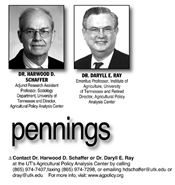|
Censorship And Exile

During the spring and early summer of this year, we have seen what we can only characterize as the hostility of the administration toward the employees of the United States Department of Agriculture (USDA). And, no we are not talking about the deeply damaging consequences of the trade war with China that sent soybean prices plummeting and put pressure on the prices of other agricultural commodities.
We are talking about the administration’s decision to move most of the USDA Economic Research Service (ERS) functions to Kansas City and the decision to prohibit publication of press releases for papers ERS has funded that touch on issues involving climate science.
From our perspective both of these decisions reflect the administration’s hostility to the “deep state.” What the administration calls the deep state we see as the apolitical work of the dedicated civil servants who carry on their work regardless of the political affiliation of the administration that happens to be in power.
One of the reasons the US established an apolitical civil service was to have employees who would do their work based on their expertise and not their political connections. Their dedication is to their science and their fulfilling the requirements of their job descriptions and not to spinning their work to accommodate the political winds of the day.
Instead of supporting USDA personnel, “The Trump administration has refused to publicize dozens of government-funded studies that carry warnings about the effects of climate change…” (Politico investigation, “Agriculture Department buries studies showing dangers of climate change” by Helena Bottemiller Evich). This type of behavior does not serve the public well and is contrary to the kind of analysis we rightly expect from USDA funded research in which USDA scientists are often directly involved.
Though, based on different understandings of the nature of agricultural markets, we may sometimes come to different farm policy conclusions than economists in ERS, we want to read what they write, and we support their work. When it comes to climate science, we clearly want to know about the possible impacts of rising levels of CO2 in the atmosphere.
More generally and of equal importance, we trust the hundreds of agriculturally-related data sets that ERS maintains and makes available free of charge to all interested parties.
One of the key characteristics of effective organizations is institutional memory and if half or more of the employees quit at the same time, that would represent a significant loss of institutional memory. That concerns us because there are times when we want to obtain an obscure publication for our research. When we cannot find the information online, we call the Albert R. Mann Library at Cornell University. When they cannot find the publication, we turn to ERS specialists and their institutional memory. It may take a couple of days, but they always can find the document we are looking for. At that point we are appreciative of what others dismissively call the deep state.
If the proposal to move the bulk of ERS operations to Kansas City takes place and the personnel loss approaches one-half, we worry about the short-term and longer-term effectiveness of ERS. In our view, it might take a couple of decades to get it back to its fully productive self. The climate-change publication problem is a censorship issue, pure and simple.
What will the future bring? Will the research community, Congress, and agricultural interests in general be able to depend upon the USDA to provide insightful unbiased analyses, honest and comprehensive data sets, and access to older data and publications that are sometimes only available because someone knows where to look? ∆
DR. HARWOOD D. SCHAFFER: Adjunct Research Assistant Professor, Sociology Department, University of Tennessee and Director, Agricultural Policy Analysis Center
DR. DARYLL E. RAY: Emeritus Professor, Institute of Agriculture, University of Tennessee and Retired Director, Agricultural Policy Analysis Center
|
|